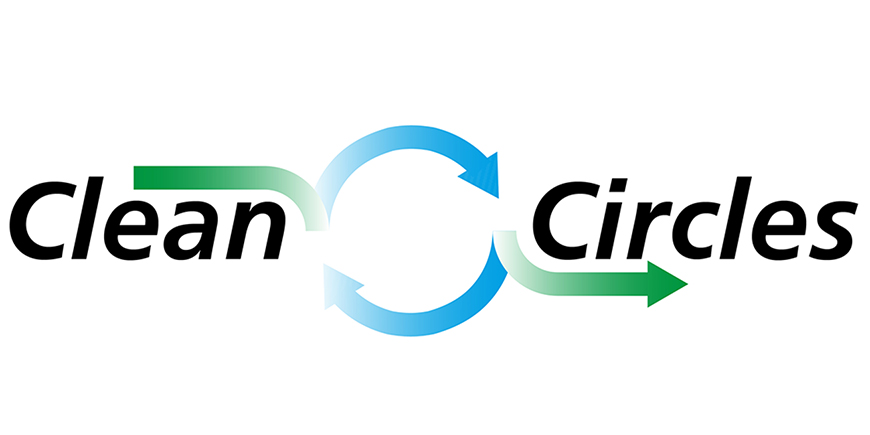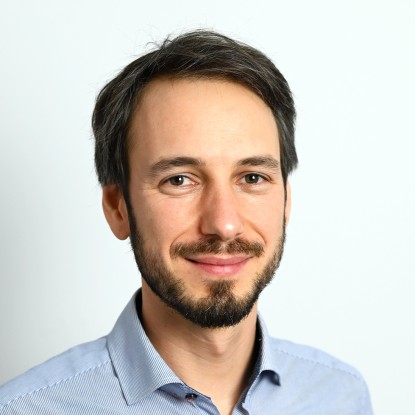Member of the Bundestag Till Mansmann visits Research Field E+E
Will metals complement hydrogen as the energy carrier of the future?
2024/07/25 by SWa
On Thursday, July 25, Till Mansmann (FDP), Member of the German Bundestag and Innovation Commissioner of the Federal Ministry of Education and Research, visited innovative hydrogen projects from the Energy + Environment (E+E) research field on the Lichtwiese campus at TU Darmstadt.
Till Mansmann was welcomed by the Vice President for Research, Professor Matthias Oechsner, and the spokesperson for the E+E research field, Professor Peter Stephan, at the Center of Smart Interfaces on the Lichtwiese campus. Mr. Mansmann has been Innovation Commissioner for Green Hydrogen at the Federal Ministry of Education and Research since 2022. His visit therefore focused on innovative hydrogen projects at TU Darmstadt, which are primarily concerned with the provision, storage and use of green hydrogen.
Innovative materials and new energy carriers
TU scientists provided an insight into current research projects in the field of hydrogen production. First, Professor John Linkhorst from the Department of Process Engineering of Electrochemical Systems presented current research projects at TU Darmstadt. The focus was on innovative catalysts and reactor concepts for the electrolysis of green hydrogen. Finally, he presented the research idea of the energy ship as a potential new resource for decentralized hydrogen supply.
The focus then turned to another innovative building block for the energy transition. Marius Schmidt from the Clean Circles cluster project explained the research project, in which metals as energy storage and energy carriers contribute to a diversified and resilient energy system of the future.
The core idea: energy from the sun and wind is stored as chemical energy in iron or aluminum and can therefore be stored long-term or transported over long distances. The energy is released again through oxidation and can be used in the form of heat or as the resulting hydrogen without releasing CO2. Instead, solid metal oxides are produced, which are regenerated or recycled. With the help of such sustainable cycles, hydrogen can be produced decentrally and energy can be imported or stored seasonally – an important building block for the energy transition and an addition to the hydrogen strategy. Furthermore, the power plants currently powered by coal and the associated infrastructure could be converted to be climate-neutral and continue to be used. In addition to basic research, the step towards application is an important goal of the researchers.
Mr. Mansmann then visited the laboratory of the Institute of Reactive Flows and Diagnostics. There, research on reactive metals was demonstrated at first hand.
Research for a successful energy transition
The Member of the Bundestag was very impressed by the research work and technical developments in the field of hydrogen production: “As the Innovation Commissioner of the Federal Ministry of Education and Research, it is my job to promote and accelerate research and development in the field of green hydrogen. It is impressive to see the innovative strength with which TU Darmstadt is already researching a wide range of solutions, for example for energy storage, and developing and implementing them in interdisciplinary collaboration with other research institutions and industrial partners.”
Mr. Mansmann emphasized how important the support of such research initiatives is for the development of new technologies and processes, especially for the industries, and praised the work in the E+E research field as an outstanding example of scientific excellence, which also strengthens Germany as a business location through its practical application possibilities. The issues of supplying, storing and using hydrogen are central to the decarbonization of the energy system and require close cooperation between politics, science – and industry.
TU Vice President Oechsner commented on the visit, during which both the challenges and future visions for a green hydrogen economy were discussed: “The exchange with Mr. Mansmann made it clear how our diverse research in the field of energy can be linked to the German government's National Hydrogen Strategy for a successful energy transition. This visit represents an important step for further cooperation between science and politics in order to jointly shape the future of research and development in the field of energy and the environment.”
The Energy + Environment research field and the Technical University of Darmstadt would like to thank Mr. Mansmann for his visit and the recognition of their research work.






